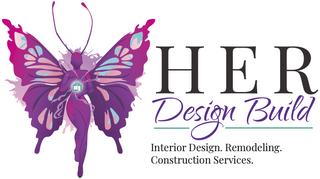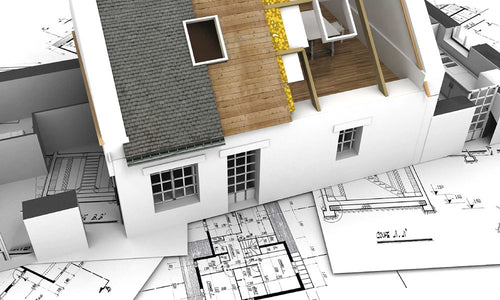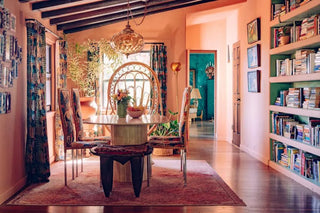
African American homeowners prioritize wellness via natural materials, plants and, especially, cultural representation.
African Americans who own their homes are committed to wellness design – a trend amplified since the pandemic struck in 2020. To see how that’s showing up in purchases, design and remodeling priorities, I reached out to range of African American professionals for their work in the Black community:
- President of the National Association of Real Estate Brokers and Houston area broker Courtney Johnson Rose;
- Indianapolis area general contractor and board member of the National Association of the Remodeling Industry Keianna Rae Harrison;
- Kitchen and bath designer Ebony Stephenson in Newport News, Virginia;
- Interior designer Marilyn LaVergne in Northern New Jersey;
- Washington, DC-based interior designer Sarah C. Wilson;
- Los Angeles area Interior designer and TV host Breegan Jane.
These are the trends they shared in a series of email interviews. It all starts, of course, with a successful home search. “Since COVID, I have seen an increase in interest in the livability of homes,” Rose wrote, and they’re willing to spend more for it. Features her homebuyers are prioritizing include a downstairs bedroom suite, workout room, pool, smart home features, water filtration and ample natural light.
Mental Health Focus
Many African Americans see their homes as retreats or sanctuaries for mental health purposes, the pros agreed. “We are bombarded on a weekly and sometimes even daily basis of mass shootings, wars, pandemics, racial tensions, and the televised murders of people who look like us,” Stephenson shared, noting that this bombardment can lead to overload. “They specifically contact companies like mine for guidance on how to make their homes a space of retreat to escape this outside world.”
“We have found that homeowners are doing more to protect their mental health space and they want more time alone and to be closer to nature at home. Recently, we’ve designed more beautiful, functional outdoor spaces that connect to kitchens and family rooms than ever,” Harrison added.
Wellness Remodeling
Harrison has seen wellness design interest spike post-Covid, but clients are not specifically asking for it that way, she noted. They too are interested in first floor primary suites, as well as bathroom safety and accessibility, and good lighting. She’s also noticed an increase in multi-generational households needing services. “In the last four years, we have designed a significant number of spaces that include features to accommodate three generations of families living under one roof,” she reported. Other interests that have emerged among her African American clientele are germ reduction capability (e.g., handsfree faucets), personalization, and biophilia.
Stephenson’s clients are prioritizing accessibility, indoor air quality, biophilia and features that facilitate homesteading, like gardens to support self sufficiency and healthy eating. Gardening is also a growing interest with Breegan Jane’s clientele. “I am incorporating more and more raised garden beds for clients, as they seem to be increasingly interested in ways to grow their own food and become more health conscious with diet and food consumption.”
Wilson’s DC-clientele are interested in steam showers, aging in place capability and paint that doesn’t off-gas, she shared: “More people are traveling to places that incorporate health and discovering they can have it at home.” (That has long been true for clients visiting resort spas here and abroad, and bringing home requests to their bathroom designers.)
Wellness Interior Design
LaVergne says her clients are requesting fitness spaces, especially among empty nesters, improved HVAC systems for healthier indoor air quality, healthy finishes like natural fabrics, wood, bamboo, hemp, stone and glass, plants, layered LED lighting, and sound absorbing finishes for what she calls “relaxed contemplation.”
One wellness design trend you’ll see in her work (and others’) for African American clients is cultural representation. “It amplifies self-awareness, reflects heritage and affirms personal identity. To that end, our projects include African art, artifacts and textiles,” the New Jersey designer adds.
“I think we often forget the role of art in wellness design,” Breegan Jane adds. “Art can absolutely play a part in creating a space that feels uplifting and energizing, and my African American clients are now investing more into black artists and artistry as a way to identify and display their stories in beautiful ways throughout their homes.”
Inspiration
Homeowners seeking more ideas and inspiration for African American home spaces can find many in Iconic Home: Interiors, Advice, And Stories from 50 Amazing Black Designers (Abrams, 2023). This 256 page book, full of four color photography, was written by June Reese and Black Interior Designers, Inc., an international professional association founded in 2010.
Follow me on Twitter or LinkedIn. Check out my website or some of my other work here.
Forbes source: https://www.forbes.com/sites/jamiegold/2024/02/23/wellness-design-trends-in-the-african-american-community/?sh=4e8938278c8a




